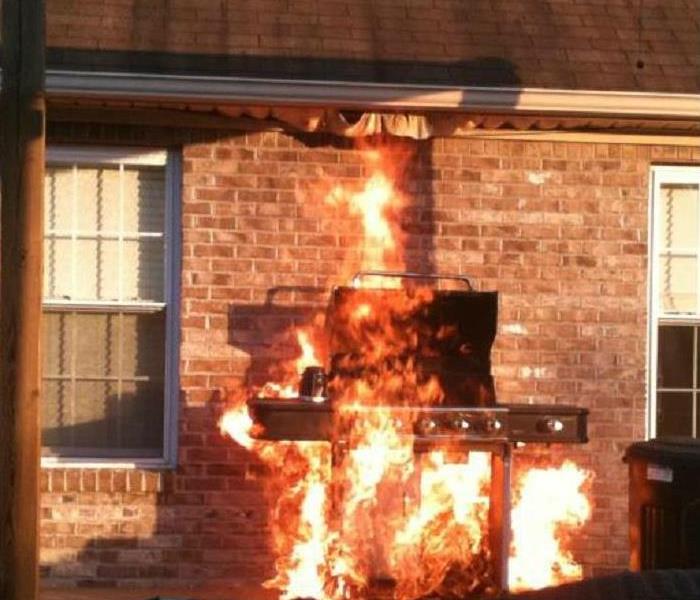Fire Safety When Grilling This Summer in New Haven County
6/6/2018 (Permalink)
 Although this house is brick, it was still not safe to cook on the grill this close! The fire was able to reach the vinyl overhang and catch.
Although this house is brick, it was still not safe to cook on the grill this close! The fire was able to reach the vinyl overhang and catch.
Finally! Summer is arriving and we are all excited for barbecues, the beach, camping and fireworks. Nothing says summer like late nights around a fire pit with friends. Summer brings fun activities but we should also be aware of the increased risk of fire during these months. Awareness of the risks and taking caution when participating in fire related activities will keep your summer safe.
Grill Fires
Grilling is our favorite way to cook in the summer. Barbecued food tastes delicious, grilling keeps the heat outside on a hot summer day and there are no pots to clean afterwards. It's a win-win-win if it all goes right. However, 5,700 home related grill fires occur each year – the majority of which occur between May and August.
Take preventative measures by:
- Inspecting your grill’s condition before the grilling season begins. Clean the grill, the drip pan, and anything that could have grease on it from previous barbecue dinners. Inspect each part of your barbecue to make sure everything is attached properly.
- Make sure that your grill is a safe distance from your house – 10 feet is recommended. I've personally experienced how quickly the vinyl siding on a home can melt from a barbecue. Do not use the grill in a garage, breezeway, carport, porch, or under a surface that can catch fire.
- Be prepared for a fire, as grease and fat are likely to catch on fire. Keep baking soda in a waterproof container near the grill in case a grease fire breaks out.
Air Conditioning Fires
According to the National Fire Protection Association, in 2010, air conditioning, fans or related equipment were involved in an estimated 7,400 reported U.S. home structure fires, with associated losses of 29 civilian deaths, 249 civilian injuries and $207 million in direct property damage. These fires usually begin with the ignition of a wire or cable insulation. It’s not just the AC that catches on fire, if your AC heats up, flammable materials near your unit can catch on fire. Fires are most likely to occur when it’s hottest outside—between 2 and 8 p.m.
- Inspect your air conditioner’s wiring systems each year to prevent these types of fires. Consider the safety concerns of purchasing an older or used air conditioning unit.
- Also, find ways to use the AC less during the day. Not only will you save money, you can save your home from a potential fire. Using fans, keeping windows open during the night, and closing blinds during the day are just some ways you can keep your house cool without AC.
We're looking forward to seeing everyone out at the beach and grilling out in Milford this summer! Stay safe and have fun!





 24/7 Emergency Service
24/7 Emergency Service